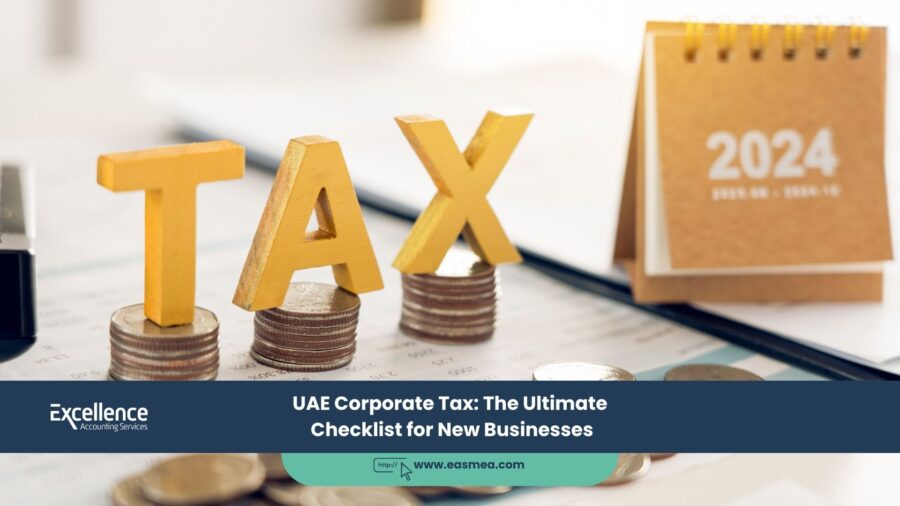UAE Corporate Tax: The Ultimate Checklist for New Businesses
Launching a new business in the UAE is an exhilarating journey, filled with opportunities for growth and innovation. Amid the excitement of developing products, finding customers, and building a team, it’s easy to overlook the foundational aspects of financial compliance. However, with the introduction of UAE Corporate Tax, establishing a robust tax framework from day one is no longer just good practice—it’s a legal imperative.
- UAE Corporate Tax: The Ultimate Checklist for New Businesses
- Phase 1: Pre-Launch & Foundational Setup
- Phase 2: Accounting & Record-Keeping Infrastructure
- Phase 3: Ongoing Compliance & Reporting
- Phase 4: Strategic Tax Planning
- How Excellence Accounting Services (EAS) Supports Your Journey
- Frequently Asked Questions (FAQs)
- Don't Navigate Corporate Tax Alone.
For a new business, the decisions made in the initial months can have long-lasting tax implications. Failing to register on time, maintaining inadequate records, or misinterpreting the law can lead to significant penalties, cash flow problems, and distractions from your core business activities. Proactive compliance is the only way to ensure a smooth and successful start.
This ultimate checklist is designed specifically for new businesses and startups in the UAE. It provides a step-by-step guide to navigate the corporate tax landscape, breaking down the requirements into manageable phases. From pre-launch considerations to ongoing strategic planning, this guide will serve as your roadmap to not only meet your obligations but also build a tax-efficient and resilient enterprise.
Key Takeaways
- Registration is Mandatory: All businesses, regardless of their revenue or Free Zone status, must register for Corporate Tax with the Federal Tax Authority (FTA).
- Record-Keeping is Non-Negotiable: You must maintain audited financial statements and detailed records for at least seven years. This starts from day one.
- Understand Your Taxable Income: Learn what constitutes taxable income and which expenses are deductible. Not all business expenses can be claimed.
- Free Zone Status is Not an Automatic Exemption: Qualifying Free Zone Persons must meet strict conditions to benefit from the 0% tax rate on “Qualifying Income.”
- Technology is Your Ally: Implementing a robust accounting system like Zoho Books early on is crucial for accurate record-keeping and efficient reporting.
- Seek Professional Advice Early: Engaging with corporate tax consultants from the outset can save you from costly mistakes and help you build a tax-efficient structure.
Phase 1: Pre-Launch & Foundational Setup
The work begins before you even make your first sale. These initial steps create the foundation for all future tax compliance.
Phase 1 Checklist
Understand that your business entity (whether mainland LLC, Free Zone company, or branch) is a ‘Taxable Person’ under the law. This means you are subject to the UAE Corporate Tax regime from the moment of your company formation, even if your income is below the threshold.
This is a mandatory first step. You must register your business on the EmaraTax portal. The FTA has set deadlines based on your trade license issuance date. Missing this deadline will result in penalties. Don’t wait until you start earning revenue; register as soon as your business is incorporated.
Your first tax period starts on the date of incorporation and cannot exceed 18 months. Typically, businesses align their financial year with the calendar year (Jan 1st – Dec 31st). This decision is crucial as it determines your first tax return filing deadline.
Do not assume you are automatically exempt from the 9% tax. To benefit from the 0% rate, you must be a ‘Qualifying Free Zone Person’. This involves meeting strict criteria, including maintaining adequate substance in the free zone and deriving ‘Qualifying Income’. A deep understanding of these rules is essential from the start.
Phase 2: Accounting & Record-Keeping Infrastructure
Accurate records are the backbone of tax compliance. Setting up your systems correctly from the beginning is critical.
The UAE Corporate Tax Law requires businesses to prepare and maintain financial statements that are audited. This is not optional. Your bookkeeping must be robust enough to withstand scrutiny.
Phase 2 Checklist
Manual bookkeeping with spreadsheets is prone to errors and insufficient for compliance. Implement a reliable, FTA-compliant cloud accounting software like Zoho Books. This ensures all transactions are recorded accurately and provides a clear audit trail. We provide expert accounting system implementation to get you set up correctly.
Work with an accountant to create a detailed Chart of Accounts tailored to your business. This should clearly separate different types of income, assets, liabilities, and, most importantly, expenses. This makes it easier to identify deductible and non-deductible expenses later on.
You must keep all business records for a minimum of seven years after the end of the relevant tax period. This includes invoices, receipts, contracts, bank statements, and all supporting documents for your financial transactions. A clear process for digital and physical document storage is essential.
Since audited financials are mandatory for many businesses (especially in Free Zones), you should identify and engage with an approved external auditor early. They can provide guidance on your accounting practices throughout the year, making the final audit smoother.
Build Your Financial Foundation with Zoho Books
Start your business with a powerful, compliant, and scalable accounting platform. As official Zoho Partners, we can ensure your setup is optimized for UAE Corporate Tax compliance from day one.
Phase 3: Ongoing Compliance & Reporting
Tax compliance is not a one-time event. It requires continuous attention throughout the year.
Phase 3 Checklist
Regularly review your financial data to determine your taxable income. This starts with your accounting profit and is then adjusted for non-deductible expenses (e.g., 50% of entertainment expenses), non-taxable income, and other specific tax provisions. This is a core function of our accounting and bookkeeping services.
If your business transacts with ‘Related Parties’ (e.g., other companies owned by the same shareholders) or ‘Connected Persons’ (e.g., the business owner or their relatives), you must comply with transfer pricing regulations. This means all transactions must be at “arm’s length,” as if they were with an independent third party.
Your corporate tax return is due within nine months after the end of your financial year. Don’t wait until the last minute. Start preparing the necessary documentation and calculations well in advance. This includes your audited financial statements and supporting schedules.
Phase 4: Strategic Tax Planning
Once your compliance foundation is solid, you can move on to strategic planning to legally optimize your tax position.
Phase 4 Checklist
Is your current legal structure the most tax-efficient? A strategic CFO or tax advisor can review your setup to see if forming a tax group or other restructuring could offer benefits.
The way you finance large asset purchases can have tax implications. Understanding the rules around depreciation and interest deductibility can influence your decisions on whether to lease or buy equipment.
Don’t just think about tax at year-end. A periodic accounting review or tax health check can identify potential issues and opportunities for optimization before they become problems.
How Excellence Accounting Services (EAS) Supports Your Journey
Navigating the UAE Corporate Tax landscape can be daunting for a new business. At EAS, we provide end-to-end support to ensure you are compliant, efficient, and strategically positioned for success.
- For Phase 1 (Setup): We guide you through the company formation process and handle your Corporate Tax registration to ensure you meet all initial deadlines.
- For Phase 2 (Infrastructure): We offer expert implementation of Zoho Books and establish robust bookkeeping processes tailored to your business.
- For Phase 3 (Compliance): Our team manages your ongoing accounting, prepares your financial statements, and works with auditors to ensure your records are pristine.
- For Phase 4 (Strategy): Our corporate tax consultants and fractional CFOs provide high-level strategic advice to optimize your tax position and support your growth.
Frequently Asked Questions (FAQs)
Yes, absolutely. Registration is mandatory for all businesses and legal entities licensed in the UAE, regardless of their revenue or profitability. The obligation to register is separate from the obligation to pay tax. Failure to register within the FTA’s deadlines will result in penalties.
This is the taxable income threshold. Your annual taxable income up to AED 375,000 is taxed at a 0% rate. Taxable income exceeding this amount is taxed at the main 9% rate. However, even if your income is below this threshold, you are still required to register, maintain records, and file a tax return.
The deductibility of a business owner’s salary depends on the specifics of the situation. Generally, a reasonable salary that reflects the fair market value for the services provided can be considered a deductible expense. However, this is a complex area, and the payment must be a real transaction, not just an accounting entry. It’s crucial to get professional advice on this to avoid issues with the FTA.
The most common mistakes are: 1) Failing to register on time, 2) Commingling personal and business expenses, making it impossible to prove deductions, 3) Having poor or non-existent bookkeeping records, and 4) Incorrectly assuming Free Zone status provides a blanket tax exemption for all activities. These mistakes are costly but easily avoidable with proactive planning.
VAT (Value Added Tax) is a consumption tax applied to the supply of most goods and services. Businesses collect it on behalf of the government. Corporate Tax is a direct tax levied on the net profits of a business. They are two separate tax regimes with different rules, registration processes, and filing requirements. You may be required to register and file for both.
Certain specific industries, like the extraction of UAE natural resources, are subject to different Emirate-level taxation and are outside the scope of the federal Corporate Tax law. Some government entities and government-controlled entities are also exempt. However, for the vast majority of commercial businesses, Corporate Tax applies.
Yes. Even if your company had no activity and no income, you are still required to file a “nil” tax return to inform the FTA of your status for the tax period. Maintaining your registration and filing obligations is mandatory as long as the legal entity exists.
If you discover an error, you can file a voluntary disclosure to correct it. It is always better to proactively correct a mistake than to have the FTA discover it during an audit. Penalties for errors are generally lower if you self-disclose. This highlights the importance of having an accounting review before filing.
Expenses incurred before the official start of your business (pre-incorporation or pre-commencement expenses) may be deductible under certain conditions. These costs must be directly related to the purpose of the business. The rules around this can be specific, so maintaining perfect records of these early-stage expenses is crucial for claiming them successfully.
You are in a strong position to be a ‘Qualifying Free Zone Person’, but it’s not automatic. You must still meet all the conditions, including having adequate “substance” (staff, assets) in the Free Zone and filing a tax return. Your income from overseas customers would likely be ‘Qualifying Income’ taxed at 0%, but you must prove it and comply with all documentation and filing requirements.
Conclusion: Compliance as a Competitive Advantage
For a new business in the UAE, viewing Corporate Tax compliance as a strategic priority rather than an administrative burden is a powerful shift in mindset. By embedding these checklist items into your business operations from the very beginning, you do more than just avoid penalties. You build a resilient financial foundation, gain deeper insights into your profitability, and create a company that is credible to investors, banks, and partners.
A proactive approach to tax, supported by professional guidance, allows you to focus on what you do best: innovating, serving your customers, and growing your business with confidence.
Don't Navigate Corporate Tax Alone.
Let Excellence Accounting Services be your trusted partner for UAE Corporate Tax compliance and strategic financial management.




